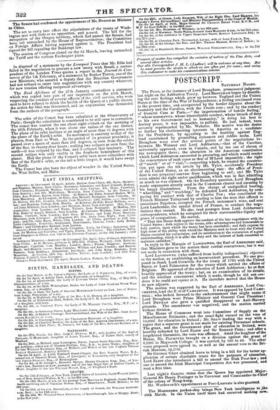POSTSCRIPT.
SATURDAY NIGHT.
The Peers, at the instance of Lord Brougham, pronounced judgment last night on the Ashburton Treaty. Lord Baoucinain began by describ- ing the sore feelings which grew up between England and the United States at the time of the War of Independence; a feeling continued even to the present time, and exasperated by the border disputes about the boundary and the Caroline, with the Creole case ; and by the conduct of General Cass at Paris,—" the impersonation of hostile feeling," " whose mancenvres, whose discreditable conduct, whose breach of duty to his own Government and to humanity," in doing his best to destroy peace, it was impossible to palliate. He had, indeed, been severely reprimanded by Mr. Webster. His motive was the desire to further his electioneering interests in America as a candidate for the Presidency, by appealing to the hostility against Eng- land entertained by gronndling statesmen and rabble mobs. Lord Brougham went over the several points of the negotiations he- between Mr. Webster and Lord Ashburton,—that of the Caroline, universally approved, even in Canada, and by ten out of eleven of the newspapers there ; the alteration in the American constitution which Lord Ashburton succeeded in procuring, and which would render the concurrence of such cases as that of M'Leod impossible ; the right of " search " or of " visit,"—respecting which, he treated the construc- tion put upon the 8th article by Mr. Tyler, accidentally President of the United States, as an electioneering ruse : the office of Presi- dent is one perpetual canvass from beginning to end ; and Mr. Tyler even admits the right under qualification, which was in fact admitting as much as was claimed. On the Boundary question, Lord Brougham made arguments already used in the Commons clearer and amusing by his happy illustrations. From the charge of undignified bearing, " wheedling," and " truckling," he defended Lord Ashburton, by com- paring his conduct with that of Charles Fox ; who conciliated the French Minister Talleyrand by sending to him the man that offered to assassinate Napoleon, accepted the French statesman's wine, and sent Lord Lauderdale, the special friend of France, to conduct the nego- tiations that ensued. He also read passages from Lord Ashburton's correspondence, which he eulogized for their statesmanlike dignity and grace of composition. He moved, That this House doth approve the conduct of the late negotiation with the United States ; doth rejoice in the terms, alike advantageous and honourable to both parties, upon which the treaty has been concluded; and doth express its high sense of the ability with which the Minister sent to treat with the United States executed his commission, and its satisfaction at the restoration of a good understanding, which it is alike the duty and the interest of both countries to maintain unbroken."
In reply to the Marquis of LANSDOWNE, the Earl of ABERDEEN said, that Ministers gave to the motion their cordial concurrence, but it was not made in connexion with them.
Lord LANSDOWNE (who suffered from bodily indisposition) objected to the motion, as establishing an inconvenient precedent. No one pro- posed to thank Lord Grenville for the treaty of 1795 with the United States, or Lord Palmerston for the treaty which settled the affairs of Belgium. He approved of the selection of Lord Ashburton: he at first heartily approved of the treaty ; but, on an examination of its details, and the needless concessions which it made, though he did not con- demn it he could not rejoice at it. He therefore moved that the House do now adjourn.
The motion was supported by the Earl of ABERDEEN, Lord CoL- errerrrna, land the E.irl of CARNARVON. It was opposed by Lord CAMP- BELL ; who looked forward to the embarrassment that might ensue if Lord Brougham were Prime Minister and General Cass President Lord DENMAN also gave a qualified disapproval on Anti-Slavery grounds. The amendment was negatived, and the motion carried without division.
The House of Commons went into Committee of Supply on the Miscellaneous Estimates ; and the usual fight ensued on the vote of 50,0001. for education in Ireland ; Mr. SHAW leading the way with a regret that a separate grant is not made for existing Protestant schools. The grant, and the Government plan of education in Ireland, were heartily defended by Lord ELIOT and Sir ROBERT PEEL; and after a lengthened discussion, the vote was affirmed. Amid the laughter of the House, Mr. PLUMPTRE brought on a division against the grant of 8,9281. to Maynooth College : it was carried, by 120 to 40. The other votes proposed were agreed to, as well as the annual vote to the Bri- tish Museum, 32,576L Sir GEORGE GREY obtained leave to bring in a bill for the better ap- plication of certain charitable trusts for the purposes of edtutation. Lord ELIOT also introduced a bill to amend the Irish Poor-law;. and one to amend the Irish Municipal Corporation Act was presented, and read a first time.


























 Previous page
Previous page